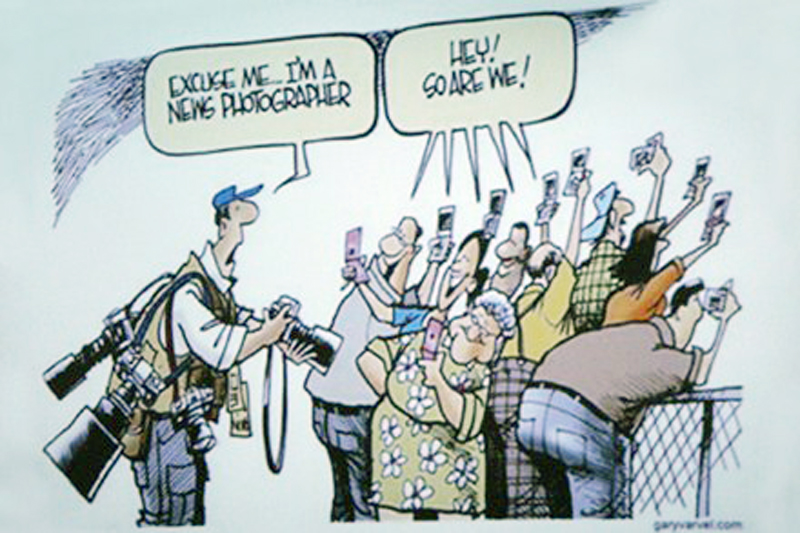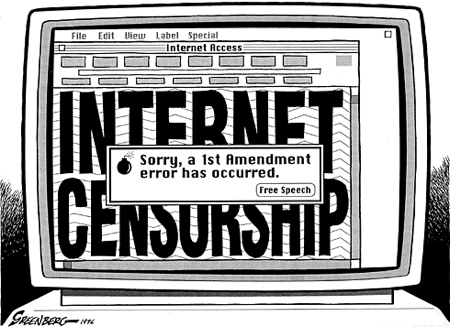 |
| (Photo via cherispeak.wordpress.com) |
Should citizens be regarded as journalists in the era of social media?
In the age of rising
social media, everyone could be a journalist as long as one has a smartphone.
People still should be guaranteed the right to know, but the idea of treating
social media as the main news source becomes troublesome. Social media targets
to connect people through different means that was not introduced before.
However, it has rose to become people's first-hand news resources, which
created the question of how much exactly are people allowed to spread on social
media, and whether or not everyone should be treated as journalists.
The Ferguson story is
probably the best example that demonstrated this issue. The story first caught
people's attention when an anonymous Twitter user (@TheePharoah) exposed the
news with his tweet saying, "I JUST SAW SOMEONE DIED OMFG." Minutes
after this first tweet, he posted a graphic picture of Brown lying on the
ground. He gave a little information about his witness of the shooting. His
tweets became viral. People were retweeting, responding, and certainly it made
headline breaking news. This rises a question, whether or not should he be
tweeting out the shooting and graphic picture of Brown lying on the
ground.
 |
| (Photo via Feross.org) |
Although I support
people's rights to know, to express, and to think, I think sometimes social
media news feed has gone overboard like the Ferguson story. As a journalism
major myself, I studied the code of ethics for journalism. Journalism, although
focuses on informing people, journalists should also give respect to different
parties involved in the story. A picture of a person lying dead on the ground
is probably not a kid-friendly picture to post on the Twitter, when so many
kids are surfing through social media sites unsupervised. Also, this might
terrified a family member of Brown, who might have stumbled upon a picture of a
seemingly loved-one killed. Journalists were given privilege to break news
because we are attached to a code of ethics. When conducting interviews and
writing stories, we try to be as considerate as possible to the parties
involved in the story. Therefore, I disapprove giving citizens the same
privileges as journalists when it comes to reporting.
Furthermore, we do not know if citizen journalists' stories are credible or not. For journalists, accuracy always comes first in the list. We always seek and evaluate sources, attribute information to people that are related to the story. Journalists take their responsibility to report accurately because their jobs depend on it. They will be penalized and indefinitely kicked out of the field if caught fabricating information. If citizen journalists started to get paid for their stories, it is hard to know if credibility still holds true in the stories. There is a good chance that citizen journalists start to write stories because they want to profit, and we probably would not be able to confirm if all the details in the stories are the truth.
Freedom of speech is a
human right, but in the age of social media, how much a person should say on
the Internet has yet to be examined. It is true that social media is slowly
becoming where many people first became informed of some news stories. Social
media is a great panel in which people are free to express what they believe
and observe daily, but that should not blur the distinction between receiving
news from journalists and discussing news with people of the Internet.
Works Cited:
Benzinga.
"Study Finds Social Media Is Slowly Burying Newspapers and Network
News." NASDAQ.com. NASDAQ, 18 Mar. 2013. Web. 06 Sept. 2014.
Tufekci, Zeynep.
"What Happens to #Ferguson Affects Ferguson:." Medium. Medium, 14
Aug. 2014. Web. 06 Sept. 2014.
I really like your ideas overall, particularly when you say that "journalists should also give respect to different parties involved in the story". This is very true; however, I am unsure about your point following that. If a family member of Brown happened to receive information about the news of his death through Twitter, would that necessarily be that bad of a thing? If I were in that position, I would much rather hear about the incident as soon as I can, rather than wait for information to come out hours later through a journalist's story. Having a journalist present the story may be more "ethical" in a sense, but not necessarily beneficial to every party involved.
ReplyDeleteThank you for pointing that out. I think I was a little bit unclear in my writing. I was trying to say, if a family member misidentified the passing person with one of his/her close family members because a tweet's information was never confirmed, it will be a rather chaotic experience wouldn't it?
DeletePut it this way, if that's say a mom saw a picture of someone who looked much like her son lying on the ground with the caption, "the police shot him, he died." I would feel very bad having to pass on this sad news via a phone to the mom, consider doing it informally with tweets of a beloved person lying on the ground and captioned "dead". All the emotions that flow through.
Yeah that is understandable. You are right, it is better to make sure that these situations cannot happen in the first place.
DeleteThis comment has been removed by the author.
ReplyDelete